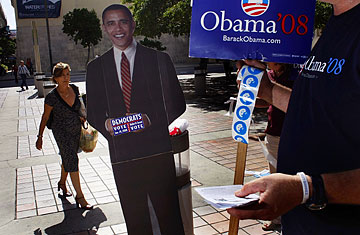
A cardboard cutout of Democratic presidential hopeful Barack Obama outside an early voting center in Miami, Florida, Jan. 18, 2008
(2 of 2)
Making matters potentially worse for Democrats in Florida is that the Republican National Committee, while also sanctioning the Florida G.O.P. for the state's primary move, has not been nearly as harsh in its punishment. As a result, Republican candidates have descended on Florida and held a nationally televised debate at Florida Atlantic University in Boca Raton last week. That's why many fear the Democrats' no-campaign-in-Florida pledge may hurt the party in November, especially among the state's large cohort of independents. The candidates' primary absence could "end up costing the Democrats 1% of the vote here," says Geller, "which is significant in Florida."
Florida's Republican Governor, Charlie Crist, who has spent his first year in office building bridges with Democrats, told TIME the DNC decision "just doesn't make any sense. Why would you thwart your eventual nominee's opportunity for any campaign activity, especially in a large state like Florida and especially when you're talking about electing the next leader of the free world? It doesn't send voters a very good message." Since Florida is such a bellwether for the nation as a whole, former Florida G.O.P. chairman Al Cardenas calls it "great news" for Republicans, vis-a-vis the general election, that national media are focused solely on them during the Florida primary.
But as for any November effect, Wexler's confident that precisely because Florida is so important, the Democratic candidates will come to stump there soon after Super Tuesday and more than make up for the primary void. "Florida is not a state the candidates will ignore," he says. Mark Brubiski, Florida Democratic Party spokesman, says that while "there has been concern on our side that this would have a long lasting impact, we've worked really hard to fight back."
In fact, Dems insist that not having their candidates in the state has compelled them to fortify their grassroots infrastructure, which has sputtered over the past decade compared to the Republicans' well-oiled Florida machine. Says Rich: "In a way it's exciting, because [Clinton's] supporters want to be out there acting as a surrogate for her. In the process we're getting our grass roots more activated and regenerated." Brubiski says the party as a result has seen a rise in Democratic registrations across Florida and new emphasis on local organization. Absentee ballot requests from Democrats are up 56% since 2004. And early voting totals already suggest that the state's Democratic voters are not being turned off by the DNC boycott; by the weekend before the primary, close to 350,000 Democrats had voted early, as compared with just 97,000 who voted early four years ago.
The final irony, according to Wexler, is that because even Super Tuesday may not solidify either Clinton's or Obama's hold on the nomination in this unusually hard-fought primary season, "if Florida had kept its primary election date where it was, it may well have played a greater role in deciding the nominee." That said, however, he still believes the Florida result will influence Super Tuesday voters even if it won't count on the delegate tally board. And he and other state Democratic leaders remain convinced, like state Republicans, that it was necessary for Florida to strike a blow for primary reform in the U.S., like the creation of rotating regional primaries, which looks more likely to happen now for the 2012 election.
As for the 2008 race, who knows — if the Democratic primaries still haven't yielded a clear winner for the nomination by the summer, perhaps the party will need to use Florida's delegates (and Michigan's) to break the deadlock. It is, after all, the kind of extra-innings electoral role Florida has played before.
